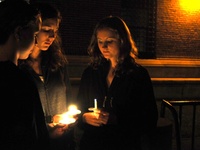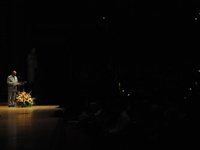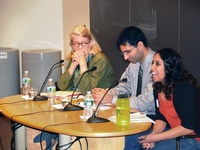Attendees had the opportunity to share their stories with one another during breakout sessions at the end of the event.
“It was really nice to hear people’s individual 9/11 stories,” said Yacine Fares ’15. “It touched on a lot of questions that I’ve had for a while and gave some answers.”
During a panel featuring student Reshma A. Lutfeali ’13, Harvard Zoroastrian Chaplain Daryush Mehta, and Eck, the audience also heard the stories of three different individuals affected by 9/11.
“Being a Muslim in America did not mean the same thing,” said Lutfeali, a Shi’a Muslim, referring to discrimination faced by members of her religion in the attacks’ aftermath. “Muslims were not considered people.”
Like earlier speakers during the day, Director of the Mahindra Humanities Center Homi K. Bhabha instructed audience members at “The Art of Survival: A Tenth Anniversary Observance of 9/11 in Words, Music, and Dance” in Sanders Theatre to continue to consider the societal implications of the terrorist attacks.
“This is an opportunity not only to remember, but also to reflect upon the state of the world and the meaning of survival and solidarity for us today,” he said.
Bhabha’s remarks preceded a series of readings and performances portraying individuals’ varied experiences in the wake of the “day that began like any other and ended like no other in recent history.” Speakers interpreted the testimonies of the first emergency response workers to arrive at the scene of the terrorist attacks, in addition to reading the letters of deceased American soldiers written to their families while serving overseas. These interpretations were punctuated by musical selections.
Bhabha also called attention to the way that the attacks damaged everyday life by introducing violence into previously peaceful public spaces.
“The wanton and willful violence turned the public spaces of civic life into a theater of war,” he said. “The everyday is eclipsed and estranged by a sense of disorientation and exposure from which there is no place to hide.”
As a testimony to the sense of chaos experienced as a result of the attacks, Elizabeth R. Moroney ’12-’13 described the confusion that she felt in witnessing the violent reprisals that occurred in the days that followed 9/11.
“I cannot find a productive reason to support the pernicious, contagious bargaining tool that not only breeds terror but also incites the terrible bigoted responses to it,” said Moroney, whose father died in the attacks, during remarks at the prayer vigil.
A short hymn from the University Choir signaled the vigil’s end. As the singers slowly exited, few people moved, lingering for several minutes as the candles were put out one by one.
—Staff writer Barbara B. DePena can be reached at barbara.b.depena@college.harvard.edu —Staff writer Melanie A. Guzman can be reached at melanieguzman@college.harvard.edu. —Staff writer Justin C. Worland can be reached at jworland@college.harvard.edu











